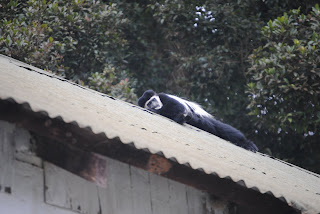Monday, 5 September 2011
The One Where We Go to Kiambethu Tea Farm (Andy)
We had a day off Wednesday and decided to go with a couple of friends to one of the last remaining, family owned, colonial-era tea farms in Kenya, the Kiambethu Tea Farm (at least I think its one of the last ones). Kiambethu is owned by a third-generation British Kenyan couple, Fiona and Marcus, and is pretty much pulled out of the average persons romantic vision about what a British colonial-era tea plantation should look like.
The grounds are pristine, as evidenced from below, so much so that you can't help but reflect on the fact that the British had an uncanny habit of picking incredibly good plots of real estate during the imperial days--including, oddly enough, plots that bore striking resemblance to the UK itself.
The house was built by Fiona's great-grandfather who came to Kenya in the early 20th century and she inherited the farm from her mother a few years ago, rather unexpected; she tells most of the story during her presentation (and its on the website), so we won't bore you with a shoddy third-party retelling.
The tour started with Fiona giving us a solid 30 min explanation, naturally over a cup of tea, on how tea is grown, harvested, processed, etc., as well as some general anecdotes about Kenya and some of the Farms guests (including, randomly, Jimmy Carter). Afterwards, we headed outside for a tour of the grounds and were distracted briefly by a pair of monkeys that, rather stereo-typically, became active only at the sight of bananas.
Our tour guide--a Kikuyu tribesman who had worked on Kiambethu since the 1960s--took us through a little bit of the forest area surrounding the tea fields and explained that this forest was the last remaining piece of virgin forest in the region and pointed out many herbal medicines that his tribe has used for centuries. Oddly enough, part of his duties on the farm also include keeping other Kikuyu attempting to take the plants out of the forest.
The hike didn't take that long and we emerged from the trail overlooking one of the picturesque fields.
We returned to the house from the hike and were surprised to find out that our tour included a home cooked meal at the farm house. While I don't have any tea tours to compare this one to, I guess I figured that, if there were to be any food available, it probably would consist of a couple plates of biscuits or crackers and that would be it. But this was a no-kidding, honest to god, meal served family-style at the dinning room table.
The meal was great--corned-beef, salad, vegetables from their garden, dessert--and I came to realize over the various courses how what we were experiencing had so little to do with the business Fiona and Marcus were running and so much to do with the way English settlers in the region had entertained guests for most of the last century. This wasn't a show for tourists; it was just the way they were used to having guests.
By way of background, Nairobi up until about the late 1970s wasn't much different from when the first Europeans hammered their way across Kenya building the railroad (that's a bit of an exaggeration, but not much). The city is now, like much of the country, expanding rapidly and erasing much of its rural past. The farm itself, while still very much in the countryside, is slowly being trapped by modern progress, which is sad because you notice how much it remains an active link with history. Nothing here seems contrived or done solely to appease the random Western tourist with romantic colonial-era fantasies (though it does seem to excel on both those fronts). Rather, this truly is a couple opening their home to strangers for a tour, a meal, and conversation. Anyone coming through Nairobi should visit here.
Subscribe to:
Post Comments (Atom)











No comments:
Post a Comment